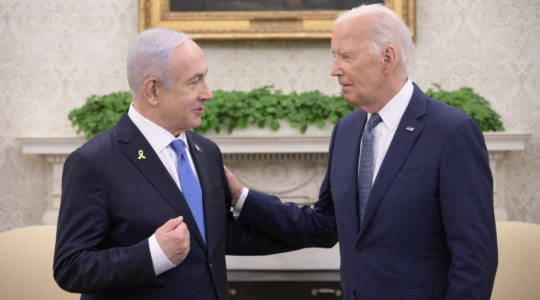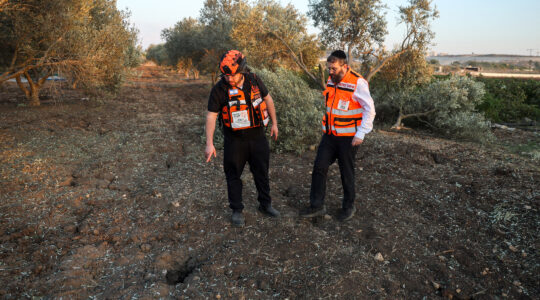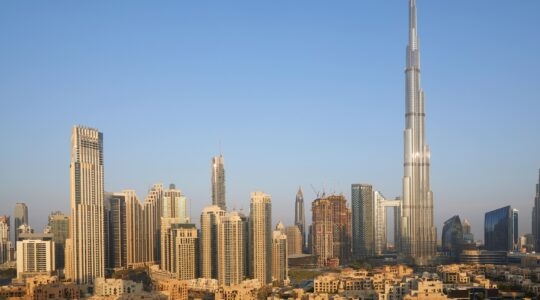JERUSALEM (JTA) – With no end in sight to Kassam rocket attacks on Israeli civilians near the border with Gaza, the Israeli government is preparing for a long struggle against radical, Hamas-led Palestinian militants.In two weeks of persistent bombardment, some 200 rockets have been fired across the border, killing at least two Israelis and injuring dozens more in the frontier town of Sderot. Now, it seems, that could be just the beginning.Although dozens of Hamas and Islamic Jihad militiamen have been killed in retaliatory Israeli air strikes, several Cabinet ministers are pressing for an even tougher Israeli response to force Hamas to back down.Both sides have an interest in continuing the fighting. Hamas wants to embarrass Israel and consolidate its position as the leading force in Palestinian politics. Israel wants to deal Hamas a crippling blow and help elevate the status of the more moderate Fatah movement on the Palestinian street. The hope is that an empowered Fatah, under Palestinian President Mahmoud Abbas, could become a genuine negotiating partner.In a Cabinet meeting Sunday, Prime Minister Ehud Olmert signaled Israel’s intentions.”There will be no limit in acting against the terror groups and against those who are responsible for the terror. No one is immune,” he warned.Indeed, there is no Israeli commitment to stop military pressure on Hamas, even if it stops firing the makeshift rockets.Israeli Cabinet ministers say they will not allow Hamas to dictate a timetable for or the extent of a cease-fire. “Only when we are sure it’s a cease-fire that won’t keep blowing up will we consider it,” Defense Minister Amir Peretz declared.Hamas has called for a cease-fire arrangement that would include Gaza and the West Bank. Israel, which withdrew from Gaza nearly two years ago, might be ready to consider a cease-fire there, even though it would provide a breather for Hamas to build up its military power. Still, that might be a price Israel would be ready to pay to stop the rocketing of Sderot.For now the bigger problem for Israel is the West Bank. The Israeli army remains active there, gathering intelligence, arresting terror suspects and intercepting would-be suicide bombers.Top army officers argue that a cease-fire suspending these activities would mean the return of suicide bombers to Israeli towns and cities. For Israel to even consider a cease-fire, the West Bank must be taken out of the equation.Hamas began the latest round of fighting with Israel in an attempt to deflect attention from its escalating civil war with the rival, more moderate Fatah. Ever since it has been trying to parlay its rocket attacks into prestige at Fatah’s expense. So ironically, the attacks on Sderot appear to be part of an intense domestic Palestinian power struggle.But there is a bigger picture. In instigating the violence, Hamas is also trying to undermine any chances for an Israeli-Arab peace dialogue based on the 2002 Arab League peace initiative. That initiative has been accepted by Arab moderates such as Saudi Arabia, Jordan, Egypt and Fatah; it is rejected by Iran and its Hezbollah and Hamas allies.”Everything is being organized by Iran,” Deputy Defense Minister Ephraim Sneh told the Jerusalem Post.Buoyed by the perceived success of Hezbollah’s Iranian-backed rocket attacks on Israel during last year’s Second Lebanon War, Hamas is trying to further undermine Israeli morale.Hamas believes that time is on the Palestinians’ side, that if it just keeps up the pressure, Israel eventually will collapse. That is why it rejects the two-state solution; Hamas believes that if it waits long enough, all of Israel will fall into its hands.The poverty and chaos in Gaza, exacerbated by Israeli retaliation and security measures such as closing the borders to Palestinian workers, feed into Hamas’ operational plans. Young people without job prospects are joining the relatively well-paid militias.Israel’s handling of the current standoff, therefore, is vital. The fighting between Hamas and the Israel Defense Forces is like the Second Lebanon War in microcosm. This time Israel wants much different public perceptions of the outcome. That could help restore Israeli deterrent capabilities, which suffered in the wake of Lebanon.Other players also have significant roles. The United States, which wants to see the moderates prevail, is arming and training Fatah. It believes that by pinpointing Hamas, Israeli attacks can help restore the balance between the two major Palestinian factions in Gaza.At the same time, the United States has put forward a plan for easing Israeli pressure on Palestinian civilian life in the West Bank. The idea is both to weaken Hamas and to show the Palestinian people that only moderates like Fatah can get results.Other moderates in the region are trying to send similar messages. King Abdullah of Jordan, fearing that chaos in neighboring Iraq and in the Palestinian territories could destabilize his regime, is trying to foster an Israeli-Palestinian agreement without his country being seen as negotiating for the Palestinians.Egypt, worried about chaos in Gaza spilling over into its territory as well as the specter of a powerful Iranian-backed Hamas influencing Islamic radicals in Egypt itself, also is trying to mediate cease-fires between Hamas and Fatah, and between Hamas and Israel.In Israel there are two unique approaches to the Hamas conundrum. The government seems to be saying that Israel must smash Hamas to pave the way for the return to power of the more moderate Fatah. This in turn would facilitate negotiations on the establishment of a Palestinian state.Some analysts hold, however, that all Palestinian factions except Hamas are too weak to deliver on any commitments they might make. Therefore, the thinking goes, instead of trying to smash Hamas, Israel should negotiate with it. Instead of a two-state solution, Israel could discuss Hamas’ ideas for a long-term hudna, or cease-fire.What happens next on the negotiating front will depend on how the Hamas-Fatah standoff works out.”Hamas’ violent clashes with Fatah in the streets of Gaza are nothing more than a dress rehearsal for the great confrontation the group anticipates in June or July,” political analyst Akiva Eldar wrote in Ha’aretz.If current efforts to prevent them fail, the outcome of those anticipated clashes could determine the contours of Israeli-Palestinian ties for years to come.

Help ensure Jewish news remains accessible to all. Your donation to the Jewish Telegraphic Agency powers the trusted journalism that has connected Jewish communities worldwide for more than 100 years. With your help, JTA can continue to deliver vital news and insights. Donate today.





